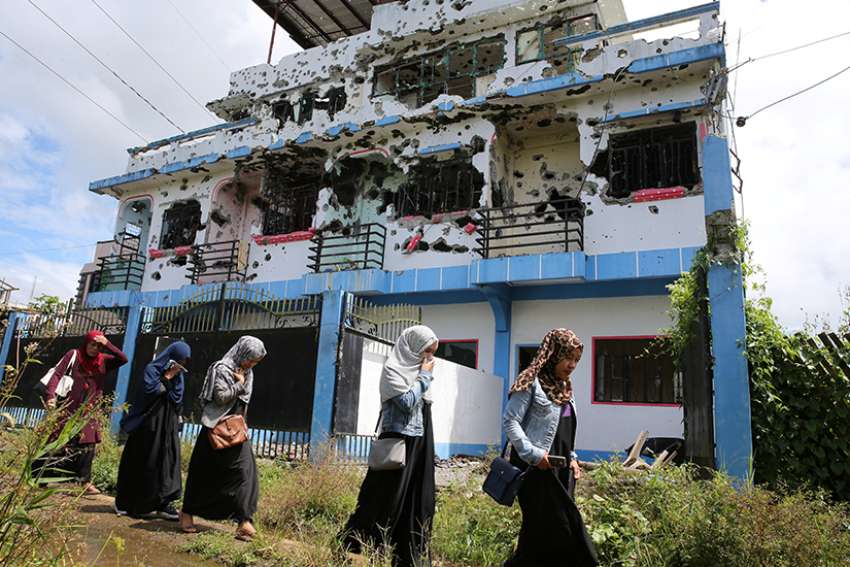Residents who returned from evacuation centres walk past a bullet-ridden house Oct. 29, 2017, believed to have been used by pro-Islamic State militant group leaders in Marawi, Philippines.
CNS photo/Romeo Ranoco, Reuters
Philippine church leaders fear suicide bombing may heighten tensions with Muslims
By Catholic News Service
COTABATO, Philippines – Security forces were placed on full alert in the southern Philippine region of Mindanao following a deadly suicide bomb blast in Basilan province that killed 10 people.
Catholic Church leaders in the region warned that the July 31 attack -- blamed on the Abu Sayyaf terror group -- could heighten tensions between Christians and Muslims in the region, ucanews.com reported.
"There can never be peace if we continue this kind of attitude of fomenting fear among our people," Archbishop Martin Jumoad of Ozamiz said.
The prelate, who served as bishop of Basilan for 14 years, said the attack makes the achievement of peace on the island elusive.
The powerful explosion at a military checkpoint in the city of Lamitan killed six soldiers and four civilians. The driver of the vehicle that exploded also died in the blast.
The vehicle, rigged with improvised bombs, went off while being examined by the soldiers.
The attack came a week after President Rodrigo Duterte signed the Bangsamoro Organic Law, which seeks to establish a new Muslim autonomous region in Mindanao.
The law is part of a peace deal signed between the Philippine government and the Moro Islamic Liberation Front aimed at ending almost five decades of war in the region.
Terrorism expert Rommel Banlaoi of the Philippine Institute for Peace, Violence and Terrorism Research, said the peace deal was not a "magic pill that can give a panacea to the multifaceted problems of armed conflicts."
He said challenges will come from local politicians and armed groups opposed to the Bangsamoro law.
Banlaoi warned that the new law could be used as leverage by the so-called Islamic State to attract foreign fighters to come to Mindanao to oppose the "cooptation of the infidels."
Archbishop Jumoad said peace in Mindanao could be achieved only if Muslims and Christians achieve unity.
Bishop Edwin de la Pena of the Marawi prelature said the bomb attack was "violent extremism at its ugliest manifestation."
"We condemn this act without reservation," said the prelate of the war-torn city of Marawi, where about 400,000 people lost their homes during clashes between security forces and Islamic State-inspired fighters in 2017.
Bishop de la Pena said the Abu Sayyaf group, which is known for abducting and killing hostages in Basilan, bungled the opportunity for dialogue with this week's attack.
Duterte announced in July that he was inviting the group for talks in line with his efforts to bring peace and stability to Mindanao.
Gov. Mujiv Hataman of the Autonomous Region in Muslin Mindanao condemned the blast as a "brazen act of violence against our people."
The governor assured the families of the victims of help, adding that he would strengthen security in the region without compromising the rights of the people.
Tagged under:
Please support The Catholic Register
Unlike many media companies, The Catholic Register has never charged readers for access to the news and information on our website. We want to keep our award-winning journalism as widely available as possible. But we need your help.
For more than 125 years, The Register has been a trusted source of faith-based journalism. By making even a small donation you help ensure our future as an important voice in the Catholic Church. If you support the mission of Catholic journalism, please donate today. Thank you.
DONATE

